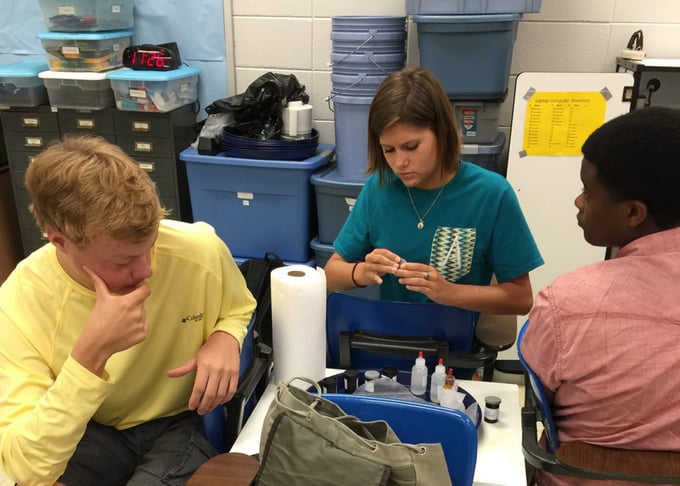Sylvia Lamb is a 27-year veteran teacher in the STEM science reform movement. She uses her original psychology degree from Louisiana State University to help motivate her students to achieve their very best in challenging biomedical science studies. She also finds that her master’s degree in education from University of Louisiana at Monroe, with its emphasis on instructional technology, helps her keep her students engaged and learning 21st-century technological job skills. These attributes helped her achieve the 2017 Secondary Teacher of the Year award in her district. She is also groundbreaking as the first PLTW Biomedical Science teacher to attain certification in Mississippi. She currently teaches 10th-12th graders the PLTW Principles of Biomedical Science course at the Career and Technical Center located at Hinds Community College.
A former co-worker, who would become my boss, called one Sunday afternoon in July to offer me a job. When she asked me what I was doing, I told her that I was binge-watching a favorite doctor’s advice TV show. She laughed because the job offer was to teach biomedical science at the Career and Technical Center. She thought someone who watched medical shows in her off time might be the person she was seeking. Thus began an amazing three-year adventure as we worked to implement PLTW Biomedical Science in our district.
Training was a shock. Perhaps if I had had time to even look at a biology book before I arrived, I would have been better prepared. I had spent the previous nine years teaching chemistry and physics, not biomedical sciences. I had been through both AP Physics and AP Chemistry training, but neither held a candle to the rigor of PLTW training. My teacher was very supportive, and the class adopted me as a simpleton sister. I came to appreciate the rigor because, as I could see as the training progressed, the course was very well planned. I finished the training with the confidence that I could teach this curriculum to my students.
When I returned to school, my boss showed me the list of supplies and equipment that my program required. I wondered where I would find room in my postage stamp-sized space. Keeping up with the barrage of boxes that arrived almost daily was challenging. So were creating wet labs in a room with no sinks. The students hauled water from the teacher’s lounge, and we poured the waste water out of the window onto the grass in the courtyard. But we could see the steady progress we were making to create our future lab.
The curriculum is wonderful. It is highly supportive with help about how long it should take to cover a topic. It provides essential questions to use as guides as well as conclusion questions to confirm that students understand the material. Despite its support, it never felt restrictive. For the first six weeks of school, we had no classroom set of computers. I improvised with an old laptop and an even older video projector.
And what an amazing change I saw in my students. I watched them transform from passive learners trying to discover the minimum amount of effort required, into avid, self-motivated learners. They caught the spark of knowledge that propelled them into seeking their own answers. They were more than idle observers; they were fired-up, active participants with a need to know.
With such a delayed start, we did not cover all of the curriculum that first year. On the last day of review, rather than panic the students by trying to rush through things they had not covered, I chose to give them a pep talk instead. I shared with them my pride in their accomplishments, both large and small. They had learned how to be self-motivated learners, how to keep a useful notebook and stay organized, as well as how to work in teams to coordinate their efforts and effectively present their findings. They learned to research and correctly document their sources.
At the state PLTW meeting, where I was one of the three PLTW Biomedical Science teachers in the state, I listened to the other (mostly PLTW Engineering) teachers talk about the scores I should expect from the End-of-Course (EoC) Assessment. They told me to expect average scores of 5 or 6. Imagine my joy when the EoC Assessment scores came back with a 9! And an 8! And four 7s and five 6s! I was ecstatic! Sadly, as the only PLTW teacher in my district, no one quite understood my joy, or the hard work the students put in to earn such high marks. But we knew!
It’s now the end of my third year teaching PLTW Principles of Biomedical Science. The young man who scored a 9 on the EoC Assessment went on to take two more years of PLTW Biomedical Science courses. He is graduating now and looking at a career in neurosurgery. I’ve learned to truly love the transformation this program brings to my students.
PLTW’s blog intends to serve as a forum for ideas and perspectives from across our network. The opinions expressed are those of each guest author.


